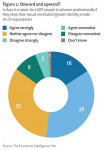Western banks expect to develop their asset management operations in Middle East, but concerns about regulatory environment persist
The survey forms the basis of Asset management in the Middle East: The prospects for global financial institutions, a newly released Economist Intelligence Unit report sponsored by the Qatar Financial Centre (QFC) Authority. The report looks at the business environment for asset management in the Middle East, examines the region’s developing investor culture and explores some of the products and services that are likely to attract attention as the sector develops.
“There is a strong appetite among global financial institutions to invest in the asset management sector in the Middle East,” says Rob Mitchell, editor of the report. "High levels of wealth are fuelling strong demand for private banking and wealth management services, while greater maturity among investors and a more robust financial infrastructure are encouraging the development of the retail investment sector. But despite these opportunities, a number of problems persist that are deterring further investment, including a lack of transparency, concerns about the regulatory environment and difficulties recruiting skilled finance professionals in the region."
The conclusions of the report are based on a survey of 180 senior executives from financial services firms conducted by the Economist Intelligence Unit and a series of in-depth interviews with representatives from companies that are already investing in the region.
Key findings of the report include:
· Private banking is seen as the strongest investment opportunity. Financial institutions that offer private banking and wealth management services see the Middle East as an increasingly important market, and many are recruiting or relocating client relationship managers to serve the region. The growing ranks of high net worth individuals, coupled with developments in the capital markets in the region, are increasing demand for more sophisticated products, including derivatives, hedge funds and exchange traded funds. Other important investment opportunities cited by respondents include private equity and retail investment.
· Islamic finance is becoming an important component of the asset management offering. Both survey respondents and interviewees questioned for the report are confident that the growth of the Islamic finance sector will continue. To date, it has not been particularly strong in many areas of asset and fund management, but this is likely to change. Almost 60% of respondents say that they expect a substantial increase in demand for Islamic finance products over the next three years, and a growing proportion of respondents say that they expect at least some of their products to be Shariah-compliant.
· Strategic alliances seen as the most favoured entry or expansion strategy. Entry or expansion strategies into the Middle East depend on individual market conditions and the regulatory environment of the specific country but, in general, respondents favour strategic alliances and joint ventures. With the provision of banking licences becoming more commonplace, however, it is likely that more and more foreign banks will take the branch licence or representative office approach.
· A number of issues continue to deter investment in the region. Despite progress in areas such as the regulatory and business environment, respondents point to a number of deterrents to further investment in the region. Concerns about the geopolitical environment remain high on the agenda for many in the sector, with 71% citing this as significant. A lack of transparency and poor standards of the regulatory regime are also raised as an issue, with 65% citing these as deterrents to investment.
Asset management in the Middle East: The prospects for global financial institutions is available free of charge at: www.eiu.com/sponsor/QFC/assetmanagement
About the report
Asset management in the Middle East: The prospects for global financial institutions is an Economist Intelligence Unit white paper, sponsored by the Qatar Financial Centre (QFC) Authority. The aim of this report is to assess the appetite among western financial services firms for setting up or expanding asset management operations in the Middle East, to explore the current risks and opportunities that are available to these firms, and to examine the economic and legislative trends that form the backdrop to their engagement in the region. The Economist Intelligence Unit’s editorial team conducted the interviews on which the analysis is based and wrote the report. The survey consisted of 180 senior executives of financial services firms from around the world who either already invest or are planning to invest in an asset management business the region.
About the Economist Intelligence Unit
The Economist Intelligence Unit is the world leader in global business intelligence. It is the business-to-business arm of The Economist Group, which publishes The Economist newspaper.
The Economist Intelligence Unit provides geopolitical, economic and business analysis on more than 200 countries, as well as strategic intelligence on key industries and management practices. With over 300 full-time professionals in 40 offices around the world, supported by a global network of more than 700 contributing analysts, the Economist Intelligence Unit is widely known for its unparalleled coverage of major and emerging markets. More information about the Economist Intelligence Unit can be found on the Web at www.eiu.com.
웹사이트: http://www.eiu.com
연락처
Edgar Fernandez
Marketing Manager, Asia-Pacific
(852) 2585 3826 이메일 보내기
Fax: (852) 2802 7007
이 보도자료는 Economist Intelligence Unit가(이) 작성해 뉴스와이어 서비스를 통해 배포한 뉴스입니다. 뉴스와이어는 편집 가이드라인을 준수합니다.




